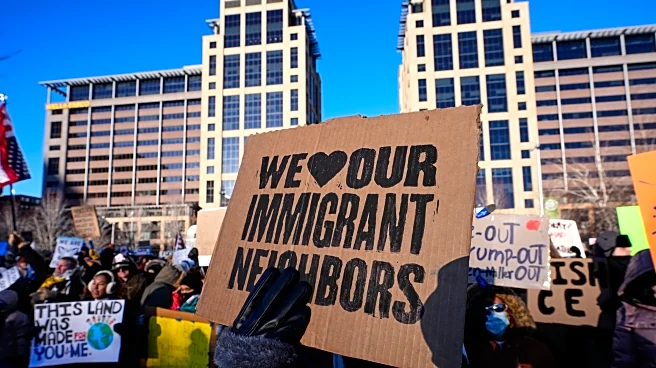Rapid Read • 8 min read
Mexican President Claudia Sheinbaum has firmly stated that the United States will not deploy military forces in Mexico to combat drug cartels. This declaration comes in response to reports suggesting that President Trump has authorized the Pentagon to take action against Latin American drug cartels. Sheinbaum emphasized that Mexico will not accept U.S. troops on its territory, reiterating Mexico's sovereignty and its stance against foreign military presence. The reports, initially published by the New York Times, have reignited nationalist sentiments in Mexico, a country with a history of U.S. invasions. Sheinbaum assured that while Mexico collaborates with the U.S. on drug trafficking issues, it will not permit military interventions. The Trump administration has previously labeled several Mexican cartels as foreign terrorist organizations, raising concerns about potential unilateral military actions.
AD
The potential for U.S. military action in Mexico could significantly impact U.S.-Mexico relations, trade, and regional security. Mexico is a key trading partner for the U.S., and any military intervention could strain diplomatic ties and affect economic exchanges. The designation of Mexican cartels as terrorist organizations by the Trump administration has already heightened tensions, with implications for cross-border cooperation on security and law enforcement. Additionally, the presence of U.S. troops in Mexico could provoke nationalist backlash and complicate bilateral efforts to address drug trafficking and immigration issues. The situation underscores the delicate balance between national security concerns and international diplomacy.
While President Sheinbaum has rejected the idea of U.S. military intervention, the Trump administration's stance on drug cartels remains firm. The U.S. may continue to increase surveillance and pressure on Mexico to curb drug trafficking. The situation could lead to further diplomatic negotiations between the two countries to find a mutually agreeable solution. Additionally, the U.S. might explore alternative strategies to address the cartel issue without direct military involvement. The international community will likely monitor the developments closely, given the potential implications for regional stability and security.
The broader implications of this development include potential shifts in U.S. foreign policy towards Latin America and the role of military intervention in addressing transnational crime. The situation raises ethical questions about sovereignty and the use of military force in foreign territories. It also highlights the challenges of balancing national security with respect for international law and diplomatic relations. The outcome of this situation could influence future U.S. strategies in dealing with organized crime and its approach to international partnerships.
AD
More Stories You Might Enjoy












